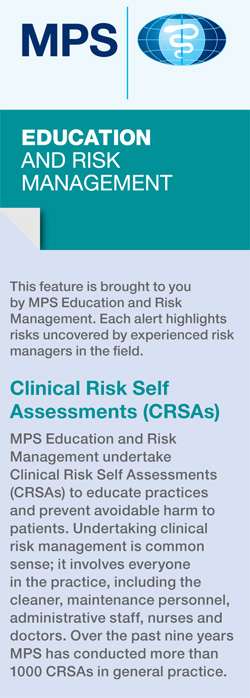 In this alert Julie Price, MPS’s Clinical Risk Programme Manager, highlights the risk of healthcare assistants performing immunisations
In this alert Julie Price, MPS’s Clinical Risk Programme Manager, highlights the risk of healthcare assistants performing immunisations
Our team has identified the use of Healthcare Assistants (HCAs) undertaking immunisations in general practice as a risk area. There is no definitive list of tasks that an HCA can undertake. Whatever task is delegated to an HCA, the healthcare professional or registered clinician must ensure that the HCA is trained and has the necessary knowledge, skills and competence to undertake the tasks delegated to him/her, and that accountability is clear.
The Nursing and Midwifery Council states that: “The delegation of nursing or midwifery care must be appropriate, safe and in the best interests of the person in the care of a nurse or midwife. The decision to delegate would be judged against what could be reasonably expected from someone with their knowledge, skills and abilities when placed in those particular circumstances.”1 In many practices GPs delegate the task of administering certain injections to HCAs – for example, flu and pneumococcal vaccinations and vitamin B injections. Some HCAs are now being asked to administer pertussis vaccination for pregnant women.2
During our CRSAs (Clinical Risk Self Assessments) we identified that this is being undertaken on occasions by the HCAs without the HCA having Patient Specific Directions (PSDs) in place. The Nursing and Midwifery Council states that: “A Patient Specific Direction (PSD) is a written instruction from a qualified and registered prescriber for a medicine including the dose, route and frequency or appliance to be supplied or administered to a named patient.”3
Prior to administration of any vaccine by an HCA to a patient, the HCA must obtain a signed authorisation (such as, patient list signed by GP or independent prescriber) to administer the vaccine and complete the vaccination record sheet that details the patient name, date of birth, vaccine given, dose, batch number and expiry. This is a legal requirement under the Medicines Act (1968). Where an HCA is unsure about any aspect he/she must refer to a clinician for advice before administering the vaccine.
 The PSD must:
The PSD must:
- state the name of the patient
- state the name and dose of the prescription only medicine to be administered
- show evidence to confirm that the patient has been considered as an individual.
The use of a template may assist for this purpose, for example:
A PSD for vitamin B injections could state: name, DOB, medication, dose, frequency of administration, review date, and be signed by the independent prescriber/GP and HCA, then scanned into the record.
The flu vaccinations could have a PSD attached to the list of patients signed by the independent prescriber and the HCA. For pertussis vaccination there should be a signed PSD for each patient. Patient Group Directions (PGDs) that were introduced in August 2000 constitute a legal framework which allows certain healthcare professionals, eg, practice nurses, to supply and administer medicines to groups of patients that fit the criteria laid out in the PGD.
HCAs cannot and should not vaccinate or administer immunisations on the basis of a PGDs, PGDs are only to be used by qualified healthcare professionals. Within general practice, HCAs are required to work in situations where constant close supervision is not always possible. This means that HCAs need to be able to share the responsibility for working safely and correctly.
Education, training and assessment will help to give them the confidence to do this successfully. Employing GP partners are vicariously liable for the acts and omissions of the HCA. All HCAs should have adequate indemnity arrangements in place for the task they undertake. It is essential that practices inform MPS of tasks that the HCA is undertaking to ensure that adequate indemnity arrangements are in place.
Percentage of practices who identified the risk
- Communication 99%
- Confidentiality & Caldicott 96%
- Prescribing 96%
- Record keeping and visits 96%
- Health and safety issues 94%
- Test results 88%
NB. This data analyses the results of more than 120 CRSAs conducted during 2012.
References
- Nursing and Midwifery Council, The Code: Standards of Conduct, Performance and Ethics for Nurses and Midwives (2009)
- Health Protection Agency, Pertussis vaccination programme for pregnant women (2013)
- Nursing and Midwifery Council, Standards for medicines management (2010)
Useful links
- BMA, Patient Group Directions and Patient Specific Directions in General Practice (2010)
- Hand T, Influenza Vaccinations by Healthcare Assistants in Primary Health Care (2009)
- RCN, Healthcare Assistants and Assistant Practitioners
- Health Protection Agency, National Minimum Standards and Core Curriculum for Immunisation Training of Healthcare Support Workers (2012)